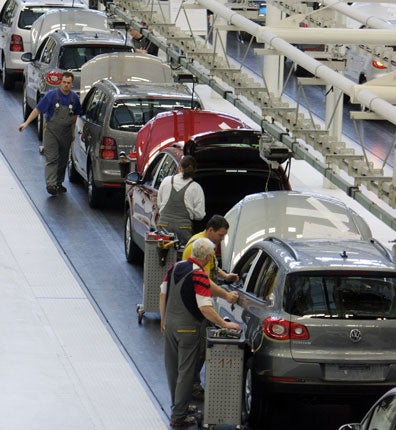Cash flows into Europe as economies bounce back
Traditional sectors are a good bet despite the high euro. Julian Knight reports

Your support helps us to tell the story
From reproductive rights to climate change to Big Tech, The Independent is on the ground when the story is developing. Whether it's investigating the financials of Elon Musk's pro-Trump PAC or producing our latest documentary, 'The A Word', which shines a light on the American women fighting for reproductive rights, we know how important it is to parse out the facts from the messaging.
At such a critical moment in US history, we need reporters on the ground. Your donation allows us to keep sending journalists to speak to both sides of the story.
The Independent is trusted by Americans across the entire political spectrum. And unlike many other quality news outlets, we choose not to lock Americans out of our reporting and analysis with paywalls. We believe quality journalism should be available to everyone, paid for by those who can afford it.
Your support makes all the difference.One credit crunch later and the economic order in Europe changed dramatically.
It used to be Britain in Europe's fast lane, more dynamic, entrepreneurial Blighty running rings around the staid, manufacturing-based and heavily bureaucratic French and German economies. Now, though, Britain looks likely to be the last of the major economies to drag itself out of recession. The economies of France and Germany, on the other hand, as the recent gross domestic product figures show, are pulling out of recession at pace, leaving Britain in their wake.
But what does this mean for private investors, and what are the prospects for turning a profit? "Investors have virtually ignored European companies and funds over the past decade for two reasons. Firstly, many lost a packet during the bust in technology stocks, and secondly, other parts of the world have been much more dynamic than Europe," said Ben Yearsley from investment advice firm Hargreaves Lansdown. The Investment Management Association (IMA) figures show that the least favourite sector among private investors in three of the past nine years has been Europe.
But times seem to be changing. "As an industry we have seen money flowing into European funds and shares from institutional investors such as pension funds. This has not been replicated by private investors yet but it may be soon," said Barry Norris, manager of Ignis Argonaut European Alpha fund. And in August, the IMA figures showed Europe, not the US or emerging markets, topping the league table of total cash being invested.
It is probably difficult to think of Europe as the next big thing after so long in the investment doldrums, but there are undoubtedly some compelling reasons to look to the continent for investment opportunities. "We are in the recovery phase. Companies that ran down their inventories during the turmoil of last autumn are now replacing them, while credit markets have eased and crucially European companies are paying dividends to shareholders," said Mr Norris. Mr Yearsley said that Europe benefits from having strong brands in traditional sectors, an attractive proposition to investors still feeling the pain of the recession. "Europe is full of good companies in areas such as car manufacturing and pharmaceuticals. Big brands appeal in uncertain times," he added.
Direct investment in shares is always highly risky, and it's not as easy for the small private investors to buy company shares overseas as it is in the UK. The overwhelmingly popular route for investors looking to Europe is to go for funds such as unit and investment trusts which invest in a basket of company shares. Mr Yearsley likes the look of long-standing fund Jupiter European and Henderson/New Star European special situations fund. "The latter fund invests in smaller to medium sized companies, riskier but potentially quite rewarding," he said. Fund expert Adrian Lowcock from independent financial adviser Bestinvest likes Casenove European. "It's a blue-chip fund offering broad exposure, investing in any or all European markets outside the UK, and makes a good core holding for any portfolio," he said. "It has a very experienced manager, and has delivered consistently good returns."
But there are a few flies in the ointment, said Mr Lowcock. "The euro is very high at present which means that it may well lose value during the term of the investment which could adversely affect returns." Mr Yearsley puts it this way: "If you buy a European fund today and it gains, say, 30 per cent over three years but the euro devalues against the pound by 25 per cent, when you come to take your money back you gain only 5 per cent. Currency risk always has to be factored in and the worrying thing is I can't see any good reason for the euro being as high as it is."
Even Mr Norris has his concerns. "My worry is that central banks will raise interest rates too soon and kill off the recovery but I reckon there is no danger of that till summer next year."
Join our commenting forum
Join thought-provoking conversations, follow other Independent readers and see their replies
Comments